|
Mao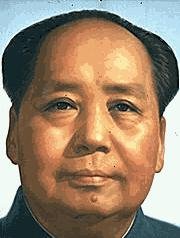 Mao Zedong didn't set out to be the world's most lethal dictator. It was never his goal to kill more than 80 million of his own people. But then, sometimes things just happen. And anyway, somebody's gotta be the world's deadliest political leader.
Mao Zedong didn't set out to be the world's most lethal dictator. It was never his goal to kill more than 80 million of his own people. But then, sometimes things just happen. And anyway, somebody's gotta be the world's deadliest political leader.
Mao had a dream of bringing anarchism to China, and as quickly as possible. But there was a paradox. The only way to abolish the government and prevent its re-emergence would require eliminating all the people who are constantly fucking it up for the rest of us: landlords, financiers, bureaucrats, outside agitators, and other criminal types. And Mao realized that this could only be accomplished by imposing a total dictatorship. So the path to a government-free utopia began with autocracy. Which is precisely what Mao announced after the Communists came to power in 1949. Ever since, China has reaped the rewards of its "people's democratic dictatorship," which has in turn manifested its beneficence toward the citizenry in myriad ways. For instance, there was the Great Leap Forward, a revolutionary policy initiative intended to bootstrap China's fledgling economy and establish it as the world's largest steel and grain exporter. Announced in 1959, Mao's brainchild involved three major endeavors: 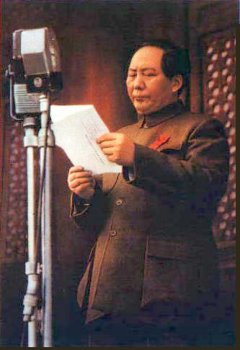
No one had ever suggested to farmers that they could double or triple their crop yields by simply packing their seeds two or three times closer together. In practice, however, this new technique failed miserably: the seedlings crowded each other and prevented any of them from receiving adequate sunlight and soil nutrients. But everyone was afraid of Mao's temper, and so no one told him that his idea was worthless. Instead, his underlings reported bumper crops, although the opposite was actually the case. Another of Mao's agricultural tips fared almost as poorly. He decreed that farmers make a concerted effort to hunt down and kill each and every sparrow. The birds were seen as pests, which ate the farmers' crops. In actuality, the sparrows were eating insects which lived on the crops. So the farmers were in fact slaughtering one of their few allies in the battle for pest control. And then there was the steel. Whereas you or I might have taken a hundred thousand idle farmhands and assigned them to work in a few steelmills, Mao's plan was something else entirely. He directed the farmers to stay home and wait for those bumper harvests to arrive. In the interim, they were to construct and operate backyard furnaces for smelting steel. They were given production quotas. In order to meet the quotas, the ignorant peasants resorted to melting down whatever metalstuffs they had lying around: hinges, doorknobs, utensils, tools. It was all converted into useless slag and dutifully turned over to the government. This godawful steel found its way into public works, like bridges and dams. Not surprisingly, many of these poorly-engineered structures collapsed dramatically or were abandoned.
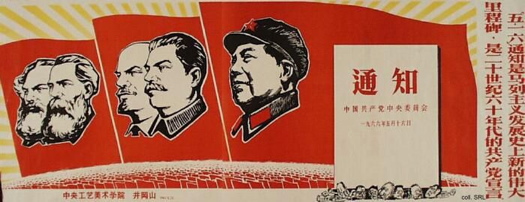
So the Great Leap Forward was an unqualified failure. But nobody wanted to tell Mao that. He believed himself to be infallible, and had a history of making life uncomfortable for anyone who dared question his policies. Which is why his lackeys waited months before telling him about the famine. That's right, famine. As in: "the worst famine in the history of mankind." Some estimates put the total as high as 43 million dead. Over a period of three years, beginning in 1958, China's agricultural production completely bottomed out. The combination of the economic policies of the Great Leap Forward along with an unprecedented drought resulted in disaster for domestic food production. The entire population suffered. People all over China were starving. But hardest hit were the hapless populace of rural Henan province. When the farmers could not meet their production quotas in 1959, the local government declared that the farmers were hiding their harvests and denounced the citizenry as enemies of the people. Military patrols were sent to locate these hidden caches of grain. The soldiers beat families who failed to cough up the food they were assumed to have hidden. When winter arrived, the peasants had nothing to eat but tree bark and grass. The officials saw to it that the families' cooking pots were smashed, to prevent them from cooking grass soup. As an incentive to finally release their hidden stores of food, thousands of peasants were tortured and murdered by the local government. Military forces patrolled train stations and roads to block escape. The people had nothing to eat. They filled their stomachs with whatever they could find: leaves, weeds, leather, straw, feathers, dirt. When they had run out of everything, absolutely everything, they finally resorted to cannibalism. People dug up freshly buried corpses. When somebody died, it was common for family members to hide the fact and keep the body for themselves. The government turned a blind eye to the situation, as people were rarely prosecuted for cannibalism. By 1961, Mao had no choice but to relent. He swallowed his pride and bought grain on the world market. He was forced to disband the communes and return to proven farming methods. The backyard steel efforts were abandoned. In political terms, the failure of the Great Leap Forward was a stunning personal defeat for Mao. And the critics inside his own government began to gather momentum.
Predictably, the Red Guard began by murdering teachers and school administrators. Then they destroyed the Tibetan monasteries. Foreign diplomats were lynched. Next were artists, scholars, and intellectuals. And whenever Mao denounced one of his former comrades, the Red Guard made it their mission to eradicate the offender. And when they ran out of enemies to torture and kill, the various Red Guard factions turned on each other, resulting in street warfare. These waves of repression and killing continued in spurts for more than three years. Millions of people were killed, and the economy left in shambles. The Cultural Revolution continued unabated until Mao's death from Parkinson's disease in 1976. Five years later, the Chinese government issued a declaration condemning the excesses of the Cultural Revolution. The sweeping "Resolution on Certain Questions in the History of Our Party Since the Founding of the People's Republic of China" included this tersely-worded indictment of the man:
Chief responsibility for the grave "Left" error of the "Cultural Revolution," an error comprehensive in magnitude and protracted in duration, does indeed lie with Comrade Mao Zedong. [...] far from making a correct analysis of many problems, he confused right and wrong and the people with the enemy. [...] Herein lies his tragedy.Oh yes, poor Mao.
timeline
|
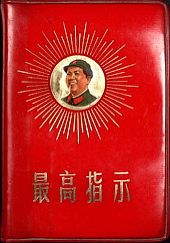 During the next five years, Mao learns to better manage his public relations. At his direction, the Chairman's "little red book" is published, containing pithy quotations about the nature of struggle and so on. A cult of personality is born. Which brings us to Mao's other major achievement. In August of 1966, Mao launched The Cultural Revolution, an effort to purge the country of all dissident thought (by means of bashing in the brains of all dissident thinkers).
During the next five years, Mao learns to better manage his public relations. At his direction, the Chairman's "little red book" is published, containing pithy quotations about the nature of struggle and so on. A cult of personality is born. Which brings us to Mao's other major achievement. In August of 1966, Mao launched The Cultural Revolution, an effort to purge the country of all dissident thought (by means of bashing in the brains of all dissident thinkers).
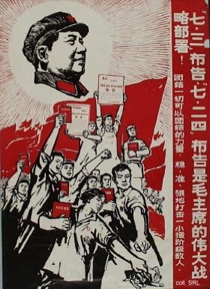 Leveraging his newfound popularity among the youth, Mao called for students to abandon their studies and form militia groups, to aid the army in the ouster of undesirables. The youths happily complied. Upwards of 11 million schoolchildren joined the Red Guard and traveled to Beijing to await further orders. Mao's defense minister told the mobs that their mission was destroy every throwback of traditional culture and philosophy.
Leveraging his newfound popularity among the youth, Mao called for students to abandon their studies and form militia groups, to aid the army in the ouster of undesirables. The youths happily complied. Upwards of 11 million schoolchildren joined the Red Guard and traveled to Beijing to await further orders. Mao's defense minister told the mobs that their mission was destroy every throwback of traditional culture and philosophy.